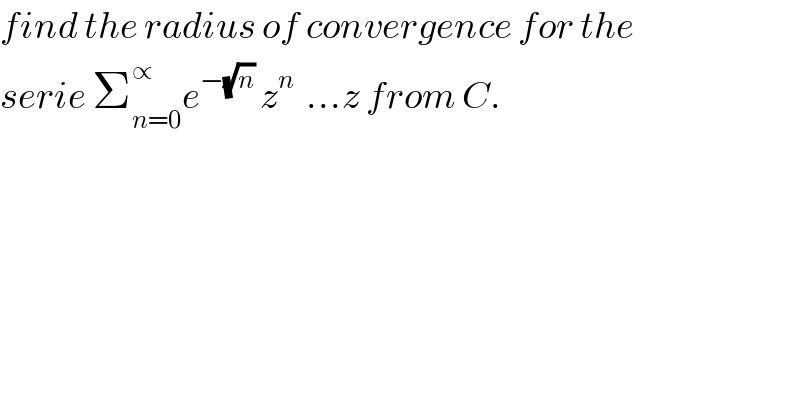
Question Number 26176 by abdo imad last updated on 21/Dec/17

$${find}\:{the}\:{radius}\:{of}\:{convergence}\:{for}\:{the} \\ $$$${serie}\:\sum_{{n}=\mathrm{0}} ^{\propto} {e}^{−\sqrt{{n}}} \:{z}^{{n}} \:\:...{z}\:{from}\:{C}. \\ $$
Commented by abdo imad last updated on 23/Dec/17
![we put u_(n(z)) = e^(−(√n)) z^n and for z not o /(u_(n+1(z)) /u_(n(z)) )/ =/ ((e^(−(√(n+1))) z^(n+1) )/(e^(−(√n)) z^n ))/ =e^((√n)−(√(n+1))) /z/ but lim _(n−>∝) e^((√n)−(√(n+1))) =e^((−1)/((√n)+(√(n+1)))) = 1 finally the serie converge⇔/z/<1 if z=−1 Σ e^(−(√n_ )) (−1)^(n ) is convergent because its a alternating serie for z=1 the serie Σ e^(−(√n)) is convergent because the integral ∫_0 ^∞ e^(−(√t)) dt is convergent(the function ψ(t)=e^(−(√t)) is decreasing in[0.∝[⇒interval of convergence is D_c =[−1.1]](Q26303.png)
$${we}\:{put}\:\:{u}_{{n}\left({z}\right)} \:=\:{e}^{−\sqrt{{n}}} \:{z}^{{n}} \:\:{and}\:{for}\:{z}\:{not}\:{o} \\ $$$$/\frac{{u}_{{n}+\mathrm{1}\left({z}\right)} }{{u}_{{n}\left({z}\right)} }/\:\:=/\:\frac{{e}^{−\sqrt{{n}+\mathrm{1}}} \:{z}^{{n}+\mathrm{1}} }{{e}^{−\sqrt{{n}}} \:{z}^{{n}} }/\:\:={e}^{\sqrt{{n}}−\sqrt{{n}+\mathrm{1}}} /{z}/ \\ $$$${but}\:\:{lim}\:_{{n}−>\propto} \:{e}^{\sqrt{{n}}−\sqrt{{n}+\mathrm{1}}} \:={e}^{\frac{−\mathrm{1}}{\sqrt{{n}}+\sqrt{{n}+\mathrm{1}}}} \:\:=\:\mathrm{1}\:\:{finally}\: \\ $$$${the}\:{serie}\:{converge}\Leftrightarrow/{z}/<\mathrm{1} \\ $$$${if}\:{z}=−\mathrm{1}\:\:\:\Sigma\:{e}^{−\sqrt{{n}_{} }} \:\:\left(−\mathrm{1}\right)^{{n}\:} {is}\:{convergent}\:{because}\:{its}\:{a}\:{alternating}\:{serie} \\ $$$${for}\:{z}=\mathrm{1}\:{the}\:{serie}\:\:\:\Sigma\:{e}^{−\sqrt{{n}}} \:\:{is}\:{convergent}\:{because}\:{the}\:{integral} \\ $$$$\int_{\mathrm{0}} ^{\infty} {e}^{−\sqrt{{t}}} \:{dt}\:{is}\:{convergent}\left({the}\:{function}\:\psi\left({t}\right)={e}^{−\sqrt{{t}}} \:{is}\:{decreasing}\right. \\ $$$${in}\left[\mathrm{0}.\propto\left[\Rightarrow{interval}\:{of}\:{convergence}\:{is}\:{D}_{{c}} \:\:=\left[−\mathrm{1}.\mathrm{1}\right]\right.\right. \\ $$
